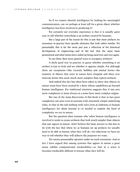So if we cannot identify intelligence by looking for meaningful communication, can we perhaps at least tell for a given object whether intelligence has been involved in producing it?
For certainly our everyday experience is that it is usually quite easy to tell whether something is an artifact created by humans.
But a large part of the reason for this is just that most artifacts we encounter in practice have specific elements that look rather similar. Yet presumably this is for the most part just a reflection of the historical development of engineering—and of the fact that the same basic geometrical and other forms have ended up being used over and over again.
So are there then more general ways to recognize artifacts?
A fairly good way in practice to guess whether something is an artifact is just to look and see whether it appears simple. For although there are exceptions—like crystals, bubbles and animal horns—the majority of objects that exist in nature have irregular and often very intricate forms that seem much more complex than typical artifacts.
And indeed this fact has often been taken to show that objects in nature must have been created by a deity whose capabilities go beyond human intelligence. For traditional intuition suggests that if one sees more complexity it must always in a sense have more complex origins.
But one of the main discoveries of this book is that in fact great complexity can arise even in systems with extremely simple underlying rules, so that in the end nothing with rules even as elaborate as human intelligence—let alone beyond it—is needed to explain the kind of complexity we see in nature.
But the question then remains why when human intelligence is involved it tends to create artifacts that look much simpler than objects that just appear in nature. And I believe the basic answer to this has to do with the fact that when we as humans set up artifacts we usually need to be able to foresee what they will do—for otherwise we have no way to tell whether they will achieve the purposes we want.
Yet nature presumably operates under no such constraint. And in fact I have argued that among systems that appear in nature a great many exhibit computational irreducibility—so that in a sense it becomes irreducibly difficult to foresee what they will do.




